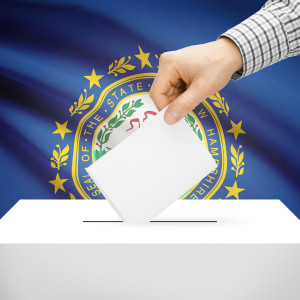With the chaos of Wisconsin’s coronavirus-plagued primary day as a backdrop, State Senate Majority Leader (and gubernatorial candidate) Dan Feltes took to Facebook Tuesday to urge New Hampshire to pursue a new approach to voting: Online voter registration, “no excuse” absentee ballots and drive-by voting drop offs.
“Today in Wisconsin, people are voting in person in their local elections, risking their very health,” Feltes said. “We need to start planning now because we don’t know what the fall will look like.”
Feltes noted that “town offices are closed to in-person business, so nobody can register to vote,” and that when Election Day rolls around, New Hampshire has a duty to protect the “volunteers who make our election function. We need to look out for them.”
“We need to adjust to the scenario that requires in-person interaction and in-person registration right now,” Feltes said.
The Democrat’s proposals for that adjustment include:
- Online voter registration;
- Voter registration via mail;
- “No-excuse” absentee voting via online application;
- Secure, drive-up ballot boxes at polling locations.
“We must protect public health and protect the right to vote,” Feltes said. No mention, however, of protecting the security of the ballot process.
“No one should forget that absentee-ballot voting is vulnerable to intimidation, fraud and chaos as all-mail elections move behind closed doors beyond the oversight of election officials. Not to mention prolonged counting and potentially lengthy delays in certifying questionable results.” That’s the view of J. Christian Adams and Cleta Mitchell of the Public Interest Legal Foundation (PILF) in a recent op-ed promoting ballot security. Adams is a former Department of Justice attorney and Mitchell was appointed to the American Bar Association‘s Standing Committee on Election Law.
Like many Americans, they worry about a system in which a vote is cast by someone whose ID is never confirmed at any point in the process.
“Online voter registration systems are built to ensure that only existing driver’s license holders can securely apply,” a PILF spokesperson told NHJournal. “Those systems aren’t built in-house in a period of months. The same can be said for online ballot request portals.”
Ballot security isn’t the priority among progressive activists promoting all mail-in balloting and no-ID voter registration. The ACLU of New Hampshire, for example, compares requiring voter ID or a secure voter registration system to “poll taxes and literacy tests.”
Executive Councilor Andru Volinsky, Feltes’ opponent in the Democratic gubernatorial primary, tweeted Tuesday: “NH must learn from Wisconsin’s failures today, plan ahead, and implement no-excuse absentee voting for our September 8th primary and November general election.”
The New Hampshire Democratic Party has long supported online voter registration and the Democratic-control state legislature passed a “no-excuses” absentee voting bill just last year. It was vetoed by GOP Gov. Chris Sununu.
The N.H. Democratic Party’s support for these voting strategies reflects the national party’s commitment to the cause. Also on Tuesday, progressive activist and former presidential candidate Sen. Elizabeth Warren (D-Mass.) released an updated version of her election-law proposals featuring many of these same ideas. Warren wants to “allow eligible individuals to vote with a sworn statement of identity instead of a voter ID, and permit registered voters to vote at any polling place within their district.”
Many election professionals say these policies would create electoral chaos. And, says N.H. Secretary of State Bill Gardner, they’re unnecessary.
“In New Hampshire, a person can already vote by absentee if the circumstances on the day of the primary or the general [election] are like they are right now. Our law has a provision for absentee ballots to anyone with a ‘disability’ that would keep them from the polls. With Gov. Sununu and the White House task force ordering everyone to stay at home, ‘health’ is keeping everyone from the polls,” Gardner told NHJournal. “We also give absentee ballots to caregivers who can’t leave home. They have the right to vote by absentee, too.”
And while some activists see mail-in ballots as an electoral panacea, Gardner points to data showing New Hampshire consistently has higher turnout with minimal mail-ins than states like Oregon and California with widespread voting by mail. Plus, Gardner says, it’s not cheap.
“We’re estimating the cost of a mail-in election at between $5 and $10 per ballot total cost. And to put the numbers in perspective, we had about 75,000 absentee ballots in 2016, out of 755,000 total. Less than 10 percent. Imagine an election where we have 90 percent absentees,” Gardner said.
And when Feltes says New Hampshire “can’t wait” to make these voting changes, he’s not far off. “Under federal law, we have to have absentee ballots ready 45 days in advance. Which means the decision has to be made in July.” July 25 for the September 8 primary, to be exact.
“The ingenuity of the leadership of the Democrat party in devising new ways to dilute the votes of New Hampshire residents is impressive,” former NHGOP Speaker of the House Bill O’Brien told NHJournal. “Former Chicago Democrat Mayor Rahm Emanuel infamously told his friends on the Left that they should ‘never let a crisis go to waste.’ Dan Feltes obviously heard that message and agrees.”

